|
|
|
Sort Order |
|
|
|
Items / Page
|
|
|
|
|
|
|
| Srl | Item |
| 1 |
ID:
144355


|
|
|
|
|
| Summary/Abstract |
The Indian saint Bahinabai (c. 1628–1700) became known to an Anglophone audience largely through A.K. Ramanujan's well-known essay, ‘On Women Saints’. As Ramanujan notes, Bahinabai's life diverges from the standard trajectory of Hindu women saints insofar as she did not reject her husband and family. However, her external conformity to the rules for women contrasts with her literary subversion of normative gender roles. I examine Bahinabai's autobiographical narrative, the Atmacharitra, to demonstrate that she claims spiritual rights for women by undermining the Brahmanical ideal of the devoted wife or pativrata. A rare example of pre-modern women's writing from South Asia, the Atmacharitra illustrates some of the diverse strategies Indian women have employed to circumvent the strictures against feminine self-expression.
|
|
|
|
|
|
|
|
|
|
|
|
|
|
|
|
| 2 |
ID:
144356
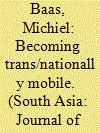

|
|
|
|
|
| Summary/Abstract |
The growth of Indian students' enrolment numbers in Australian educational institutions has often been linked to the relatively easy pathway the country, until recently, offered towards Australian permanent residency (PR). However, building on ethnographic data collected over the past ten years this article shows that ‘permanently’ residing in Australia is often not the objective. Instead, the mobility that these Indian student-migrants aim for encompasses a broader understanding of mobility that includes a variety of locations in both countries and beyond which emerge and/or are abandoned organically in an individual's trajectory. As such it is argue that their mobility strategies can be conceptualized as having ‘trans/national’ dimensions.
|
|
|
|
|
|
|
|
|
|
|
|
|
|
|
|
| 3 |
ID:
144363
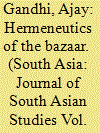

|
|
|
|
|
| Summary/Abstract |
This paper presents an ethnographic study of a redevelopment controversy in Delhi's old city. It considers the perspectives of traders, hawkers, politicians and officials on the proposed revamping of the Meena Bazaar. The paper illustrates how hermeneutic and aesthetic dimensions suffuse public and political life in India. Specifically, sincere intentions, evoked in speech and performance, are seen as a prerequisite of public presentation and as a locus of interpretive scrutiny. In an ambiguous and indeterminate milieu, promises and motives are probingly assessed, often in ironic and dramaturgical form. The paper foregrounds the ‘hermeneutics of the bazaar’, an interpretive sensitivity to intentionality, and ‘structured sincerity’, the efficacy, and reflexive steering, of performed conviction.
|
|
|
|
|
|
|
|
|
|
|
|
|
|
|
|
| 4 |
ID:
144365
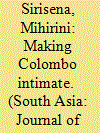

|
|
|
|
|
| Summary/Abstract |
This paper discusses the significance of considering the relationship of urban space to affective intimacy. I consider the modes through which migrant students attending the University of Colombo experience Sri Lanka's capital city. Focusing on romantic relationships, I argue that the city presents a relational space that can be transformed through quotidian intimate experiences. Students inhabit and re-orient a potentially isolating and alienating space with emotionally-inflected interactions, routines and memories. Drawing from ethnographic fieldwork conducted with students at the university in 2007–08, this paper argues that building an affectionate and living relationship with the city is a way of ‘intimatising’ it.
|
|
|
|
|
|
|
|
|
|
|
|
|
|
|
|
| 5 |
ID:
144364
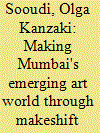

|
|
|
|
|
| Summary/Abstract |
India's art world has garnered significant attention as an ‘emerging art world’, but we know little about how such worlds emerge and are experienced by those working within them. This article explores this question of ‘emergence’ through an ethnography of the Mumbai art world. Gallerists, artists and other insiders generally perceive local conditions as insufficient and in-the-making. They juxtapose Mumbai against idealised, more established art worlds, and engage in creative, improvised ‘makeshift’ practices to remedy the limitations they see. Despite their provisional nature, these makeshift practices produce new spaces, networks and mediators in the Mumbai art world: in other words, art worlds emerge through practice.
|
|
|
|
|
|
|
|
|
|
|
|
|
|
|
|
| 6 |
ID:
144361
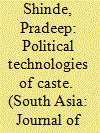

|
|
|
|
|
| Summary/Abstract |
This paper describes the political technologies of a caste certificate regularly employed by a Denotified Tribe, the Kunchikorves, in the Mumbai slum of Dharavi. The author demonstrates how the Kunchikorves mobilise kin and affine relations and engage with different organs of the state in an effort to authenticate their caste status. These ‘caste certificates’ are needed to make use of reservations policies to get government jobs and higher education. Municipal jobs and promotions are desirable as the basis for secure employment and upward mobility. Describing the circuitous methods by which the Kunchikorves obtain such authenticating documents, this paper notes that caste identity, while not hinging on notions of purity or pollution, is still an important vehicle for collective identification in contemporary India. The post-colonial state can be said to have extended and elaborated the colonial state's enumerating and objectifying imperatives when it comes to group identity. Groups such as the Kunchikorves are complicit in these objectifying measures, and actively seek out authenticating proofs of an identity that was originally pejorative, arbitrary and imposed. This paper argues that the Kunchikorves’ manufacturing of caste certificates secures them a job, while at the same time bequeathing them a caste categorisation necessarily mediated by processes of bureaucratic authentication.
|
|
|
|
|
|
|
|
|
|
|
|
|
|
|
|
| 7 |
ID:
144357
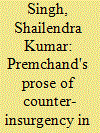

|
|
|
|
|
| Summary/Abstract |
This article suggests that the prose of counter-insurgency, as defined by Ranajit Guha, serves as a theoretical yardstick against which Premchand's discourses about peasants can be measured. This is possible, however, only if Guha's scope is broadened beyond historiography to incorporate fictional as well as journalistic writings. For someone who represents the plight of the peasant with incisive historical accuracy, Premchand's implied corrective for the peasant amounts to a radical departure from the status quo in the United Provinces. In Premchand's non-fictional prose, vis-à-vis the peasant uprisings of Awadh, there are only tangential references or a studied silence; however, his fictional works reveal the rationality of peasants, despite his insistence on compassion, rectitude and integrity. Nevertheless, he never presents peasant discontent as a collective enterprise; the alternatives are provided by the writer's leap of faith, either with the zamindar (landlord) or the sarkar (government). Premchand's literary corpus thus acts as a prose of counter-insurgency that reads peasants' protests as a threat to the social order and an impediment to the nationalist movement for swaraj (self-rule), thereby either relegating it to the peripheral spaces or discarding it altogether.
|
|
|
|
|
|
|
|
|
|
|
|
|
|
|
|
| 8 |
ID:
144359
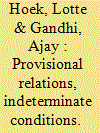

|
|
|
|
|
| Summary/Abstract |
In the introduction to this special section, we present six ethnographic articles that explore the sites and forms of ‘non-sociological sociality’ in South Asia. Set in urban spaces where the familiar vectors of relations, such as ethnicity, class, gender or age, may be attenuated, the articles examine how social and political entanglement is suffused with ambiguity, indeterminacy, provisionality and contingency. In these sites, opaque conditions, open-ended play, double meanings and interpretive scrutiny abound. Spaces such as the racecourse, the bazaar, the university campus or the nocturnal street suggest undetermined conditions and fleeting collaborations which have a wider bearing on cross-cutting forms of sociality in South Asia.
|
|
|
|
|
|
|
|
|
|
|
|
|
|
|
|
| 9 |
ID:
144362
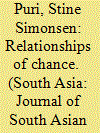

|
|
|
|
|
| Summary/Abstract |
This paper examines male friendship at the Delhi racecourse as an example of a sociality amidst an urban South Asian setting defined by uncertainty and the absence of fixed identities. It argues that such friendships are ‘relationships of chance’, embodying and reflecting the contingency of the gambling arena, rather than sociological or ritual notions which may condition friendship in other settings. This hyper-competitive and hyper-social space configures both the possibility and impossibility of friendship. The paper thus provides insights into how relating to others happens in a heterogeneous, fluid context that is over-determined mainly by a shared passion for self-enrichment.
|
|
|
|
|
|
|
|
|
|
|
|
|
|
|
|
| 10 |
ID:
144358
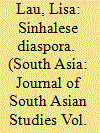

|
|
|
|
|
| Summary/Abstract |
This article investigates a particular sub-section of South Asian literature in English, namely, contemporary diasporic social realism fiction by Sri Lankan authors. It not only explores the little-discussed Sri Lankan Sinhalese diaspora which is usually overshadowed by the more numerous and better known Sri Lankan Tamil diaspora, but it also focuses on middle-/upper middle-class migrants, whose migration, assimilation and resettlement encompass a very particular set of issues, especially with relation to their class and background. Middle-/upper middle-class Sinhalese migrants from Sri Lanka are more commonly economic migrants (as opposed to political migrants, refugees or asylum seekers). Sinhalese migrants carry a considerable amount of social capital, but generally seem unable to translate this into the correct and recognised currency of the host country, leading to certain frustrations and subsequent necessary (and occasionally painful) identity negotiations. Using Sri Lankan writing in English (SLWE), this article investigates the struggles of middle-/upper-class, Sinhalese economic migrants who attempt to negotiate their integration in their new host societies at a lower socio-economic level than that from whence they came.
|
|
|
|
|
|
|
|
|
|
|
|
|
|
|
|
| 11 |
ID:
144360
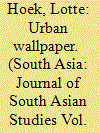

|
|
|
|
|
| Summary/Abstract |
What do film posters on city walls tell us about the relationship between the cinema and the city? In this paper, I rely on the practice and perspective of young men who put up film posters on Dhaka's city walls to explore this question. I argue that the wall is a key site for the production of a cinematic public that does not map onto film audiences; for the experience of newness in the city and of the cinema as analogous experiences; and for an encounter with imagery that is considered luminous and intense, assailing the crowds that pass by the posters in the congested city.
|
|
|
|
|
|
|
|
|
|
|
|
|
|
|
|
|
|
|
|
|